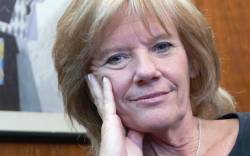In Argentina, in the early stages of the COVID-19 pandemic, the government of the City of Buenos Aires brought in a control measure that directed people over the age of 70 to ask permission to leave their homes.

Maria Tordo and Silvia Gascon (pictured), from Isalud University and the Major Network of La Plata in Argentina spoke to me about the inspiring campaign they ran to overturn this decision, telling me how civil society responded quickly to get the measure reversed.
What was your reaction when the Buenos Aires local authority said people aged over 70 had to ask permission to leave home?
When the government of Buenos Aires introduced the measure, we were totally against it. It was a totally ageist measure. Immediately after the measure was announced, we spoke with our colleagues in La Plata network, HelpAge colleagues, and a group of students at the Isalud university. We all disagreed with the measure.
Even my friends – who are in their 60s and 70s – called me and said “it’s terrible! I have to ask permission to go out of my home! I know perfectly what I am capable of, and what I am not capable of”. Our generation are empowered. We are people who have fought a lot of fights in our lifetime. So now, no one can tell us what to do!
We went ahead and wrote a simple statement outlining why the measure was wrong. We reached out to our networks, and to other people like directors of universities, as well as colleagues in other countries like Chile, Uruguay and Costa Rica, to sign the letter to show their support. We received hundreds of signatures.
Within two days, a lot of famous actors – even those from prime-time TV shows – footballers and artists came out and said they very much disagreed with the measures too.
What did you say in the statement?
We argued that older age is diverse. Our own individual biographies make a difference. Our education, our relationships, whether we have a pension, if we have had access to good healthcare throughout our lives…. All of these things determine how well we age. To talk about older people as a homogenous group with the same needs is wrong. There are more differences than similarities.
We also argued that older people know how to care for themselves. This is exemplified by the fact that many older people, especially older women, also have to care for others too. During this period of lockdown measures, older people are caring for others with no support. Many provide care and financial support to their children who have lost their jobs during the pandemic, or provide care to their grandchildren.
We also argued that the measure goes against the national constitution, which is supposed to protect our freedom and uphold equality. It is also against the Inter-American Convention on Protecting the Human Rights of Older Persons – this is a legal instrument that protects the rights of older people in the region. It means you cannot tell people who are over a certain age that he or she cannot go out and walk in the street.
Basically, we argued that the measure is ageist, and treats older people as a homogenous group who are unable to make decisions for themselves.
When was the measure overturned?
Two days after we released our letter, a judge declared the measure unconstitutional. We believe the public pressure we exerted on them, including pressure from the media, helped to get this measure overturned. We felt very happy! We had won.
Our statement came at exactly the right time. I think the most important part of being able to win a campaign is to smell what is in the air. You need to know what people are thinking and how to catch it. We have direct contact with many older people, so we know what they are thinking and how they felt about this situation. We had public support for our campaign and that’s what pushed us over the finish line.
What is the secret ingredient to win a campaign?
This instance has made our network of organisations much stronger. We feel empowered. Maria and I know that we cannot do this alone. When we plan a campaign, or we plan an action, we take a week to ask lots of people what they are thinking about the issue. We ask if they think the issue is important. This is what I mean when I say we must smell what’s in the air. It is not rigorous research, but it helps to point us in the right direction to win.
What’s next?
This campaign has helped us to make new connections. The passion is there to keep up the fight. For example, we are working with a nursing home director or to advocate for a law about the informal care homes for older people which are popping up in this province. The state doesn’t know what is happening in these places. They are not registered, and they are not regulated. The virus is spreading rapidly in these care homes. We think these places are very unlikely to have personal protective equipment for staff to protect themselves and their residents against COVID-19. So, regulation of informal care homes is the next thing we will be advocating for.
